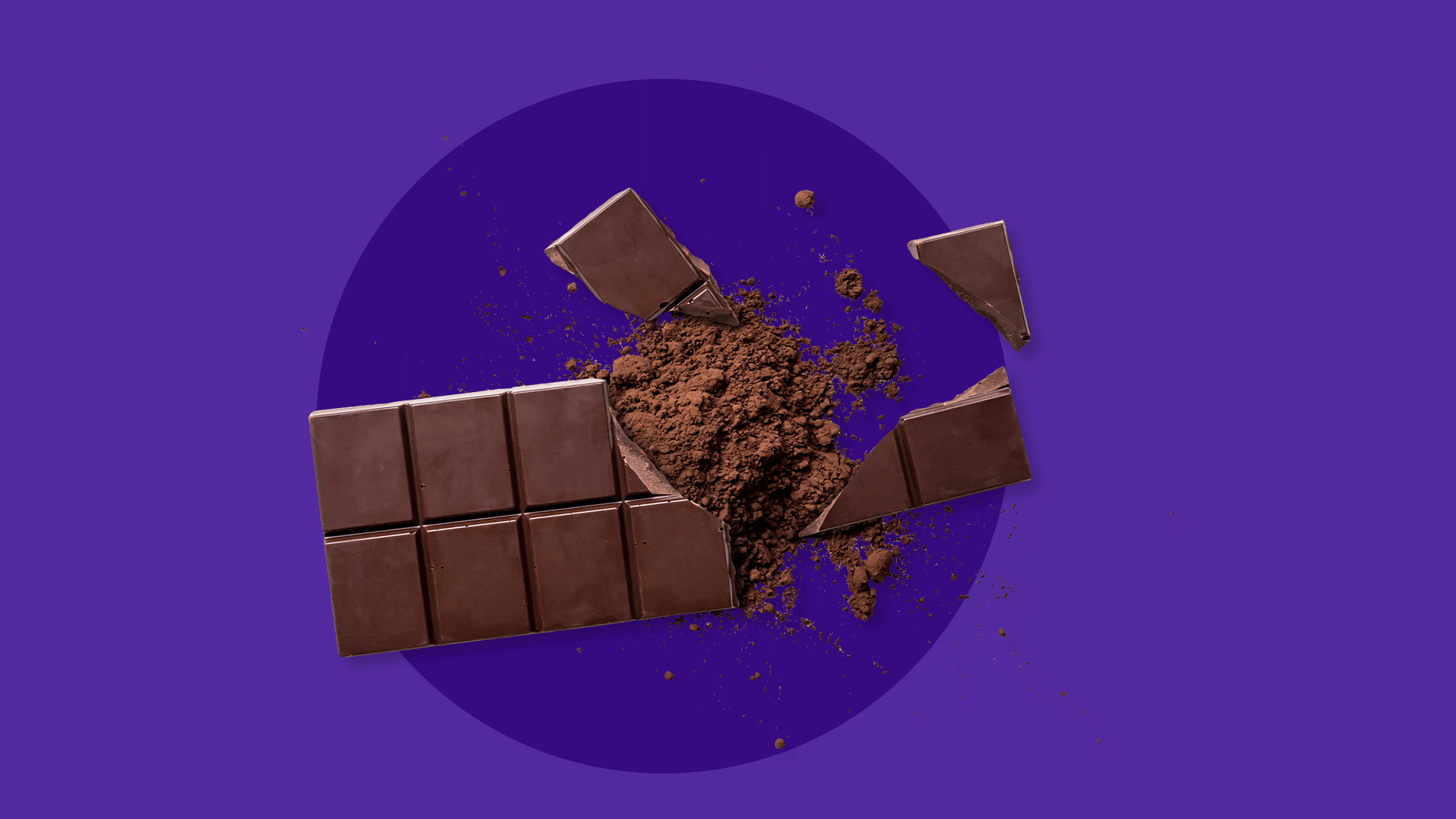Key takeaways
Dark chocolate is rich in essential vitamins, minerals, and antioxidants, offering benefits like improved heart and brain health, and better insulin sensitivity.
Consuming dark chocolate can help manage cholesterol levels, reduce the risk of heart disease, and improve blood pressure due to its high flavonoid content.
Dark chocolate’s flavanols not only boost brain function but also have potential benefits in reducing oxidative stress and improving gut health by stimulating the growth of beneficial bacteria.
Despite its health benefits, dark chocolate should be consumed in moderation due to its caffeine content, potential contribution to weight gain, risk of increasing kidney stones, and possibly worsening GERD symptoms.
Who doesn’t love eating chocolate? Okay, maybe a few people will turn their noses up at this delicious decadence, but for the rest of us, indulging in a sweet treat is a regular pastime. Unfortunately, milk and white chocolate come with a whopping dose of sugar and milk solids—and few nutrients.
The good news? Dark chocolate is rich in flavonoids and other antioxidants, which means eating the occasional square or two is good for your health. With that in mind, here are nine health benefits of dark chocolate supported by science—along with six reasons why some people might want to avoid or minimize the amount in their diet.
9 health benefits of dark chocolate
Dark chocolate is made with cocoa beans from the Theobroma cacao tree (also known as a cocoa tree). Although the health benefits of dark chocolate might not be as extensive as, say, broccoli, they certainly outweigh those of other desserts. Here are nine reasons to swap out your current confection for a helping of dark chocolate.
1. Provides essential vitamins and minerals
“Dark chocolate with a high cocoa content contains fiber and minerals such as iron, magnesium, copper, and manganese,” says Alayna Guzak, RDN, LD, a registered dietitian at The Ohio State University Wexner Medical Center. “It also contains potassium, phosphorus, zinc, and selenium.”
Your body uses minerals for many functions, such as keeping your muscles, heart, bones, and brain working properly. While not an exhaustive list, a 1-ounce piece of dark chocolate with 70%-85% cocoa solids contains the following nutrients:
- Protein: 2.2 grams
- Fiber: 3.09 grams
- Sugars: 6.8 grams
- Magnesium: 64.6 mg
- Potassium: 203 mg
- Selenium: 1.93 µg
- Iron: 3.37 mg
- Manganese: 0.553 mg
- Theobromine: 227 mg
It also contains fat, carbohydrates, and caffeine, so it’s good to remember moderation.
2. Protects against chronic diseases
Dark chocolate is full of polyphenols, an organic compound in plants. Findings from a 2018 mini-review suggest that polyphenols may have a positive effect on your health, including weight, chronic disease, cell proliferation, and metabolism regulation.
More specifically, research from the study indicates that diets rich in polyphenols may protect against certain cancers, heart disease, neurodegenerative disease, Type 2 diabetes, gastrointestinal problems, and more. In addition to dark chocolate, some of the best-known sources of this powerhouse compound are red wine, berries, and tea.
3. Improves insulin sensitivity
Dark chocolate is made of cocoa, which is rich in flavanols—the main type of flavonoid in cocoa and chocolate, according to the Cleveland Clinic. “Flavanols are plant chemicals that have many health benefits, including antioxidant and anti-inflammatory properties,” says Guzak. Flavanols can also improve how the body metabolizes glucose by reducing oxidative stress, which Guzak says can increase insulin sensitivity and reduce the risk of Type 2 diabetes. Some research suggests that polyphenols may influence glycemia (glucose in the blood) and Type 2 diabetes through different mechanisms, such as promoting the uptake of glucose in tissues and therefore improving insulin sensitivity.
4. Boosts brain function
Nibbling on some dark chocolate could boost brain function. “Cocoa or dark chocolate may improve cognitive function by increasing the blood flow to the area,” says Guzak. One 2015 double-blind controlled study showed that regularly eating cocoa flavanols can reduce some measures of age-related cognitive dysfunction in older adults.
What’s more, this same study, which included 90 older adults, found an association between improved cognition and a reduction in insulin resistance. This may point to an influential role of glucose metabolism in regulating cognitive function. Dark chocolate also stimulates the areas of the brain associated with pleasure and reward, which may decrease stress and improve mood.
5. Lowers risk of heart disease
Research from a 2017 meta-analysis shows that dark chocolate can help lower the risk of cardiovascular disease—specifically, heart disease. The same meta-analysis found that moderate consumption of dark chocolate also reduces the risk of stroke and the risk of diabetes. The heart-related dark chocolate benefits come from its high flavonoid content, which the American Heart Association says is associated with a lower risk of heart disease. To get the most health benefits, choose a bar of dark chocolate with 70% or higher cocoa content. Other products have more sugar and fat with less heart-healthy flavanols.
6. Helps manage cholesterol levels
Your cholesterol count is made up of primarily two numbers: high-density lipoprotein (HDL) and low-density lipoprotein (LDL). If you have too much LDL (bad cholesterol) and not enough HDL (good cholesterol), cholesterol will build up in the inner walls of the arteries, increasing your risk of certain diseases, like heart disease.
Observational studies of patients with diabetes indicate that consuming dark chocolate results in a significant reduction in LDL cholesterol and fasting blood sugar levels. But it’s not just LDL that benefits from dark chocolate. According to a 2017 review, flavonoids show the potential to improve HDL functioning via cellular antioxidant effects and reduced inflammation. Another 2017 study found that combining almonds with dark chocolate (in a controlled manner) reduces the number of certain LDL particles in the blood associated with coronary heart disease in obese and overweight people.
7. May reduce high blood pressure
Data shows that the flavanols in dark chocolate can stimulate the body to produce nitric oxide in the endothelium, which helps relax the blood vessels, according to the Harvard T.H. Chan School of Public Health. This ultimately improves blood flow in arteries and helps lower blood pressure and reduces the risk of blood clots, which is great news for people with hypertension.
8. Reduces oxidative stress
Dark chocolate is an excellent source of antioxidants. One study found it had even more than super fruits like blueberries and acai. According to Guzak, the antioxidant properties protect our cells from damage caused by free radicals and may play a role in cancer prevention.
9. May improve gut health
Erika Gray, Pharm.D., chief medical officer and co-founder of My Toolbox Genomics, points out that flavonoids help improve the microbiota in your gut, increasing good bacteria such as lactobacillus and bifidobacterium species and decreasing harmful bacteria such as clostridia. In fact, findings from a 2022 randomized controlled trial indicate that dark chocolate exerts a prebiotic effect, stimulating the growth of good gut bacteria.
Dark chocolate side effects
Because many people do not like the bitter taste of dark chocolate, they often choose milk chocolate or a bar of dark chocolate with a lower cacao percentage. The problem is that the lower the cacao percentage, the more sugar is added to the product. “Choosing a product with increased sugar may ameliorate the health benefits of dark chocolate,” Dr. Gray says. “The darker the chocolate, the less sugar it will contain and the more cocoa solids you will get,” says Guzak.
That’s why dark chocolate, in moderation, is a great way to satisfy a sweet tooth and increase your intake of potent antioxidants like polyphenol. But too much of the good stuff can add excess calories and exacerbate some health conditions. These are the drawbacks.
1. Contains caffeine
Dark chocolate is full of powerful nutrients that have a positive effect on your health, but it also has a higher caffeine content than milk chocolate or white chocolate. Guzak says if you are sensitive to caffeine, be aware of the content in dark chocolate: Two ounces of 70% dark chocolate can contain 50 mg to 60 mg of caffeine, according to the Harvard T.H. Chan School of Public Health. If you’re wondering about the best time to eat dark chocolate, it’s best to avoid caffeine four to six hours before bedtime. Note: Caffeine can also interact with certain medications, such as Xanax. Ask your healthcare provider how much caffeine is safe to take while on prescription medications.
2. Contributes to weight gain
Be mindful of portion size when indulging in dark chocolate, as eating too much of it may result in weight gain and further health issues due to its calorie and saturated fat content. “High consumption of saturated fats can negatively affect blood lipid levels,” Guzak says. In addition, dark chocolate also contains sugar, which Guzak says can have the opposite effect on insulin sensitivity when eaten in excess.“
RELATED: Best diet for weight loss
3. Increases risk of kidney stones
If you’re at risk for kidney stones, Guzak says you may want to avoid dark chocolate due to its oxalate content. However, if you do indulge in a square or two, she recommends eating it in combination with calcium-rich foods to bind the oxalates during digestion.
4. May worsen GERD symptoms
People living with gastroesophageal reflux disease (GERD) may want to avoid chocolate. “As mentioned, dark chocolate contains caffeine, which is believed to aggravate GERD symptoms in some people,” says Guzak. Plus, it’s high in fat, which Guzak says may cause your stomach to empty slower, making acid reflux more likely to occur.
Bottom line: Is dark chocolate healthy?
The list of dark chocolate health benefits are impressive, but only if the percentage of cocoa solids is high enough. To obtain the most flavanols—and health benefits—choose a treat with at least 70% cocoa content. Ideally, if you can handle the bitter taste, opt for a dark chocolate bar with 80% or higher cocoa content.
The amount of dark chocolate you can include in a balanced diet depends on your current health and goals. Generally, a small square or two of dark chocolate every so often is enough to keep your sweet-tooth cravings in check. The key is moderation and finding what works best for you. And of course, if you have any chronic health conditions or risk factors for disease, it’s always best to seek medical advice from your healthcare provider before adding dark chocolate to your diet.











